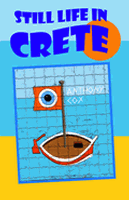Still Life In Crete: The Review. This is a story about an early retirement to Crete - this time to upper half of the village of Afrata in North Western Crete, now becoming one of the most written about mountain villages on the island, whose residents could well become more famous than the stars of Emmerdale Farm! The story of how Anthony Cox and his partner Susan Forbes and their two pug dogs arrived here in the late 1990's and spent much of the year 2000 supervising the building a new home for themselves is an interesting read. Probably a 'must' for anyone contemplating a similar move from an England no longer living up to personal expectations and in search of a new garden of Eden, or perhaps Utopia, while not really knowing where that is. In his book Tony Cox graphically describes
the difficulties involved in finding that address. Still life goes on to describe their first arrival on Crete on holiday seeking a new home; almost despairing finding their place in the sun; almost deciding after finding it that maybe they were wrong; to their move to Afrata; the real exploration of their new localities; new insights - not always pleasing; to the building of their new home on the edge of and above the village. Some of the descriptions of bumping into a rogue travel agent; their brief stay in Chania; and village life, particularly of the filoxenia experienced, being made welcome; invited to meals; gifts of food; swept into the wine-treading of the Platsakis family in Afrata make good reading. Other parts of my reading of the book I found somewhat less endearing. Still Life describes some of the surrounding towns and villages in terms which detract from the better parts of the book. Kastelli is described in one part as 'Drab' in another as '..an untidy, flyblown place shabby here, smarter there, but mostly tired looking and dirty.' and 'If this was a resort, then so was Gravesend!' although a few sentences later justifies this by
saying that perhaps the point had been missed at first and that its charm 'it's only charm' was that it had managed to remain ordinary. Kolimbari - the nearest village eastwards of Afrata is 'a nondescript place initially notable only for it's perilous crossroads.' Even Afrata does not escape with it's 'scruffy central square' although that may be better than the treatment of the next village southwards
above Afrata, Astratigos. Astratigos, Still Life says, means 'A place without a general' adding 'the place seemed to be without nearly everything else as well.' Comments which drew me to wondering about the two previous English homes described by the author - and why on earth he had chosen to settle in the area. As a reader what I wanted to read about (and certainly did in the better parts) was an Englishman and his partner conquering a new land. A hero I could identify with. What this part of the book gave me was a feeling that only the author had the right to conquer, and any thoughts that another Englishman (French, German, Italian or whatever) might entertain would not gain this particular authors approval. He didn't seem to know about those 'foreigners' already present. When he eventually asks a taverna-owner 'Are there any foreigners in the village'? He learns of an arriving German who has a Swiss daughter; Americans; French; Bulgarians(10) ; a kurd; an Englishman; two English holiday homers! And in other parts of the book names two Englishmen - one with a wife - in Astratigos and English people in another nearby village one of whom 'said that she had lectured at the London college from which I had retired.' Distracting too is the name dropping and information about what could have been. For me it seems quite irrelevant to the book that the author could once have had the desk at 'The Times' that Ian Fleming (of 007 fame) had once held. The mention of Sir Roger de Grey and his onetime comment about Tony Cox's work 'being nearly very good' I think must have been related to art and seemed a bit self-congratulatory; the suggestion by Robert Fulgrum - the American writer we may not have all heard of - that Tony Cox write a book (presumably this one) likewise distracted me from better parts of the book itself. Certainly I think that it detracted from the bit about 'Other passers by...' in the same part - especially 'Jesper a Danish
Sexologist' whose professional 'interest seemed fraught with the potential for fatal misunderstanding'. This sounded much more interesting and humorous......... maybe even dangerously adventurous! Tell me more........!! Experiences shared with the rest of us rather than kept for private consumption. |
